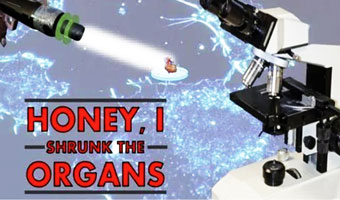
Miriam, 34, had just given birth to her third child, and, unlike the joy she felt after her first two births, she felt awful.
She was nervous about everything, locking all the doors and losing her temper with her husband and children. She hated the way she looked. Even though she hadn’t gained much weight during the pregnancy, her neck looked thick and her eyes bulged and were painful. Her family doctor explained that she was probably suffering from postpartum depression and prescribed antidepressants. He also referred her for routine blood tests. The results surprised him. Her thyroid hormone levels were very high. She was then referred to an endocrinologist, who diagnosed Graves’ disease.
“Graves’ disease, an autoimmune condition that caused all of Miriam’s symptoms, is at least four times more common in women than men, and it is sometimes triggered by pregnancy,” explains Hadassah Medical Organization senior endocrinologist Rena Pollack. About 60 to 80 percent of patients with hyperthyroidism have Graves' disease, which can cause sweating, rapid heartbeat, fatigue, and skin changes. Thyroid Eye Disease (TED) can develop in over 50 percent of Graves’ disease patients, who can experience bulging of the eyes, dryness, eyelid retraction or, in severe cases, eye movement disruption and deterioration in sharpness of vision.
“Patients may seek treatment because of visual complaints or because they recently learned they have a thyroid condition,” Dr. Pollack says. “Until now, patients have been treated separately by an ophthalmologist and an endocrinologist without adequate communication. We created this clinic where patients will benefit from a team approach. Patients will be seen on the same day by both specialists, and an individualized treatment plan will be provided to address both the systemic disease and the eye disease.”
Dr. Pollack collaborates in the clinic with Dr. Shai Kehat-Ofir, a senior ophthalmologist and oculoplastic specialist. “There are many patients suffering from TED, and the inadequate communication had to be resolved,” says Dr. Kehat-Ofir, who initiated the idea of the combined clinic. “The management involves treating the underlying thyroid dysfunction, stabilizing hormone levels, and relieving the eye symptoms, which can be vision-threatening. Treatment is tailored to the individual patient according to the nature and severity of the eye condition.”
Prof. Rivka Dresner-Pollak, director of Hadassah’s Endocrinology and Metabolism department, notes, “Modern medicine splits into different fields and requires specialization in sub-fields, which makes it difficult for patients in need of solutions from various medical specialties. At Hadassah, we see first and foremost the patient’s needs. Therefore, the trend is to create integrated multidisciplinary clinics.”
Now under professional and compassionate care, Miriam is back to her cheerful self, bringing up her children with joy. She is able to relieve the chronic symptoms of her autoimmune disease. “Even though the condition may have been brought on by her pregnancy, she isn’t limited in having more children if she wishes,” says Dr. Pollack. “Hadassah will always be here for her.”
Learn more about the Hadassah Medical Organization.









